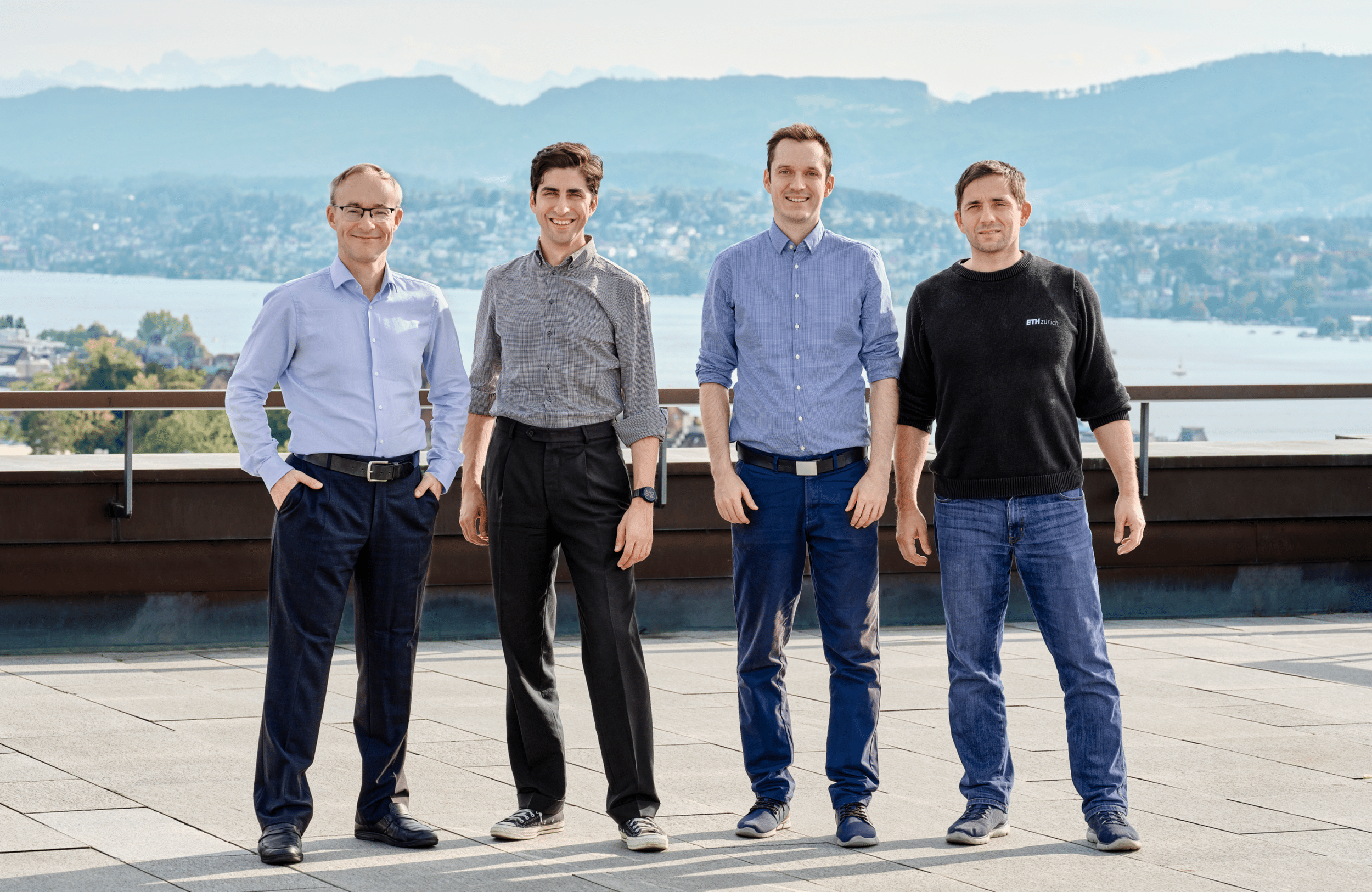9 Key Players in the Swiss AI Ecosystem
The world is going crazy for artificial intelligence. At least in the United States.
Meanwhile, Europe has - so far - been left quite in the dust.
But Switzerland, despite its small size, is punching above its weight. High-class universities, government support and cutting-edge companies form the backbone of the Swiss AI ecosystem.
Here is an overview.
ETH AI Center
The ETH AI Center is the central hub for artificial-intelligence research at ETH Zurich — spanning all 16 departments. As of late 2025 the Center comprises 135 professors (36 core faculty + 99 associated faculty), plus additional external collaborations with other Swiss universities.
It pursues a broad, interdisciplinary agenda: foundational machine learning theory, applied AI, societal and ethical implications, and knowledge transfer to industry.
Key research leads include prominent academics such as Prof. Andreas Krause (reinforcement learning, Bayesian optimization, uncertainty & robustness), Prof. Fanny Yang (statistical learning), Prof. Florian Tramèr (ML security, privacy), and external collaborator Prof. Bernhard Schölkopf (causality).
Beyond research, ETH AI Center aims to shape Switzerland’s AI trajectory: it offers doctoral and postdoc fellowships (including via bilateral cooperation with institutions such as the European ELLIS network or the Max Planck–ETH CLS program), and fosters industry collaboration across sectors.
EPFL AI Center
Together with ETH Zurich the EPFL AI Center forms the academic backbone of the Swiss national AI ecosystem. Through SNAI, they coordinate research, resources, and infrastructure at a national level.
One of the flagship projects to come out of the EPFL AI Center — the open-source LLM model Apertus — exemplifies its ambition. Built using the recently deployed national supercomputer infrastructure with >10,000 high-end GPUs, Apertus aims to provide public, transparent AI infrastructure for multilingual and research-oriented uses.
The EPFL AI Center is co-directed by Marcel Salathé (Associate Professor of Digital Epidemiology at EPFL) and Pascal Frossard (Professor of Electrical Engineering).
Swiss National AI Institute (SNAI) / Swiss AI Initiative
Launched in 2023 by ETH Zurich, EPFL and other stakeholders, the Swiss AI Initiative (via SNAI) embodies Switzerland’s ambition for coordinated, sovereign-level AI infrastructure, research and governance. The Swiss National AI Institute is anchored by senior leadership from both ETH Zürich and EPFL. At the top sit Annette Oxenius (ETH Vice President for Research), Vanessa Wood (ETH VP for Knowledge Transfer), Ambrogio Fasoli (EPFL VP for Academic Affairs) and Stéphanie Lacour (EPFL VP for Strategic Initiatives) — a governance lineup that signals institutional priority at the highest level.
Day-to-day operations are led by Alexander Ilic, the Executive Director, supported by Melanie Gabriel as Co-Director and COO. Around them sits a small but capable operational core: finance lead Flori Olteanu, operations manager Natalia Marciniak, and fellowship/programme managers such as Ulrika Pettersson and Arnout Devos. This group collectively channels the expertise of more than 70 AI-focused professors across both universities and runs Switzerland’s national-scale AI infrastructure.
The infrastructure backbone of the SNAI includes the nationally shared supercomputing resource (10,000+ GPUs) made available for frontier AI research. Among its main activities so far, the institute issues compute grants, supports open-source models (e.g. Apertus), and fosters collaboration between academia, industry and public actors.
How is AI affecting the Swiss economy?
There is no doubt that AI will have a dramatic effect on the world economy. And in Switzerland? How is AI changing things up?
Subscribe to The Swiss Insider to get a detailed briefing on Swiss politics, business and the people behind it all.
Idiap Research Institute
Idiap is among Switzerland’s long-established independent research institutes with a strong focus on AI — particularly in fields like speech processing, computer vision, biometrics, multimodal interaction, and applied machine learning. Its research routinely underpins spin-outs or startups.
The Institute was founded in 1991 by a coalition including the town of Martigny, the Canton of Valais, EPFL (Lausanne), University of Geneva and Swisscom — originally under the umbrella of Fondation Dalle Molle.
Over time, Idiap evolved into an autonomous non-profit foundation, recognised by the Swiss Confederation as an institute of national importance.
Today it hosts roughly 180 staff (2023) and works across core AI domains: speech processing, computer vision, multimodal interaction, biometrics and machine learning.
Leadership is currently under Andrea Cavallaro (Director). The Institute maintains close academic ties with EPFL and the University of Geneva, runs active PhD and training programmes, and continues to spin out technologies through its internal incubator infrastructure.
Idiap has produced a steady stream of applied-AI companies, most notably Recapp IT (speech recognition tailored to Swiss languages), Eyeware Tech (3D-camera-based eye-tracking and attention analytics), and Biowatch (vein-pattern biometric authentication for wearables).
Other spin-offs include DigitArena (AI video-stream processing and dynamic ad-replacement), Klewel (webcasting and multimedia indexing), and several smaller ventures emerging from Idiap’s computer-vision, biometrics and speech-processing labs.
Lausanne - home of the EPFL AI Center
Starmind
Starmind builds enterprise-software that maps internal knowledge and expertise within large organizations. Its AI-driven “expert network” identifies internal experts based on data and connects colleagues asking questions with the right expertise.
Founded in 2010 by Pascal Kaufmann and Marc Vontobel, Starmind draws on insights from neuroscience (notably Hebbian learning) to design self-learning neural network architectures that approximate “virtual neural tissue” — mimicking aspects of human brain networking.
As of 2025 the company reports roughly 49 employees, about US$ 5.4 million in annual revenue, and zero external funding since its 2018 raise — indicating it remains bootstrapped.
On the customer side, Starmind claims a global footprint: its platform serves companies across more than 125 countries and its clients include major corporates in consulting, pharma, manufacturing and telecom.
Scandit
Scandit is one of Switzerland’s earliest and most successful AI-powered software companies. Its focus lies in computer vision, data capture, and enterprise mobility — serving retail, logistics, supply chain and asset tracking sectors.
Scandit was founded in 2009 by three ETH-linked researchers: Samuel Mueller, Christian Floerkemeier and Christof Roduner. Today the company is led by Samuel Mueller (CEO).
Its clients include Lufthansa Group, Carrefour, DHL Group and Air Lingus.
Its investors are among the cream of the crop in investing: Warburg Pincus, Salesforce Ventures, Schneider Electric and Swisscom.
Though often not “deep-learning flashy,” Scandit is emblematic of how Swiss AI can scale globally: combining pragmatic AI (CV + edge computing + mobile) with enterprise-grade robustness. The broader Swiss AI ecosystem counts firms like Scandit among its first successful global-scale exits or growth stories.
Lattice Flow founding team - Prof. Andreas Krause, Dr. Petar Tsankov (CEO), Dr. Pavol Bielik (CTO), Prof. Martin Vechev
LatticeFlow
LatticeFlow is a spin-out from ETH (and by extension the Swiss academic AI ecosystem), focused on AI-model evaluation, robustness testing, governance and compliance. In 2021 the company was named among the top 3 Swiss AI startups.
Co-founded by Petar Tsankov (CEO, formerly of ETH's Secure, Reliable, and Intelligent Systems Lab) and Matthew Wicker (CTO, Oxford PhD in neural-network robustness), the firm applies formal-methods research to AI governance—testing models for safety, bias and compliance.
In 2025 it expanded its profile by achieving a SOC 2 attestation, and being named a “Representative Vendor” in a major analyst firm’s (Gartner’s) Market Guide for AI Governance Platforms.
The firm offers enterprise customers tools to assess AI risk, robustness and compliance — an increasingly critical need as regulators, enterprises and governments grow wary of opaque or unsafe AI models.
Neural Concept
Neural Concept, spun out of EPFL in 2018, has become one of Switzerland’s most successful deep-tech AI companies. The firm is led by co-founder Pierre Baqué (CEO), supported by EPFL machine-learning heavyweights such as Pascal Fua and François Fleuret. Their shared ambition is clear: use advanced neural networks to replace slow, expensive engineering simulations with real-time prediction and optimisation.
The company has secured roughly US$37 million in funding, including a US$9.1 million Series A in 2022 and a US$27 million Series B in 2024, backed by Forestay Capital, D.E. Shaw Group, Alven and others. Neural Concept has grown to around 60–80 employees spread across Switzerland, Germany and the United States, reflecting its transition from academic prototype to industrial platform.
Its software is used by more than 60 major OEMs. Airbus relies on it for aerodynamic optimisation; Bosch and General Electric integrate it into product-development pipelines; and several Formula 1 teams use it to accelerate car-geometry design. In each case the value is similar: Neural Concept cuts simulation cycles from hours or days to seconds, enabling engineers to explore far broader design spaces.
Swiss Cognitive
SwissCognitive sits at the intersection of Switzerland’s corporate seriousness and its global ambitions in artificial intelligence. Founded in 2016 by Dalith Steiger-Gablinger and Andy Fitze, it began as a modest attempt to make AI less opaque for executives.
It has since grown into a sprawling global network, linking companies and policymakers across more than 100 countries and 30 sectors. Unlike research institutes or startups, SwissCognitive is a convenor: its value lies in stitching together the fragmented worlds of academia, industry and government.
Together the two co-founders have positioned SwissCognitive as a neutral hub—a Swiss specialty—trusted enough to bring together CEOs, scientists and regulators who rarely share a room.
Its track record rests on scale and continuity. SwissCognitive claims a digital reach of more than half a million followers and a steady cadence of events, advisory projects and public-sector collaborations.
Its “AI Navigator” and sector-specific programmes offer companies a structured path from experimentation to implementation, helping firms that lack in-house expertise to understand where AI can genuinely move the needle.


